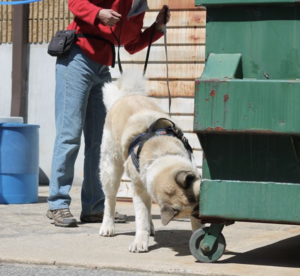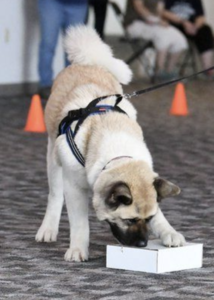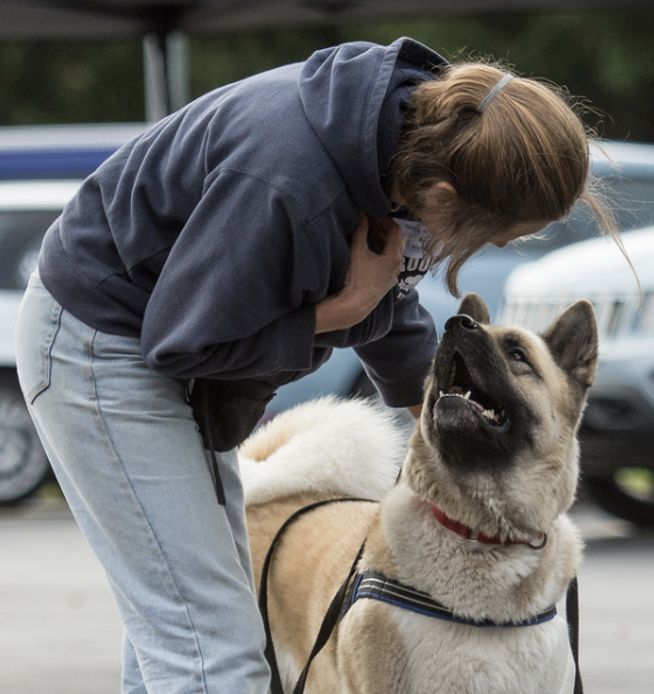Guest post by Nancy Almann, photo credit Lonnie Berger
Have you ever considered doing scent work with your dog? There are many benefits, and it can be a great activity for dogs dealing with osteoarthritis pain.
The October morning was typical: cold and damp. The wind had a bite to it. Our ten-year-old Akita, Kiyo, who has arthritis in both shoulders, elbows, and hips walked slowly on our short pre-breakfast amble around the neighborhood. Her plumed tail, which usually arcs over her back, was flat by the time we got home – a sure sign she was uncomfortable.
Yet when I picked up her nose work harness and slipped it over her head, her tail curled over her back eagerly and proudly, her head came up and her eyes sparkled. Nose work! One of her favorite activities! We did a few searches and she navigated them happily and confidently. What a great way to give her happiness and engage her brain.
What is Scent (Nose) Work?
In scent work, you and your dog work as a team and search for odor. The odor for which your dog is searching is that of essential oils. A specific essential oil is placed on a cotton swab and the swab is then put into a container – a small metal tin or piece of a soda straw, for example. The tin or the straw is called a hide. After the hide is placed and given time to “cook” (i.e., time for the odor to diffuse) it is the job of the dog and handler to locate the hide. The sport is based on the skills required for police or military dogs to find contraband or bombs.
Your dog is already an expert in this sport: Each dog is born knowing how to use his or her nose, and scent work incorporates sniffing, one of the dog’s life-long passions. Indeed, since dogs were born to sniff, this natural ability and interest in using his or her nose gives you a head start in this game and makes it remarkably easy for a dog to learn the rules of the sport. The result? A fun game for you and your dog.
Is Scent Work for Me and My Senior Dog?
The main reason to try this sport is the best one: Dogs LOVE playing games that use their noses. The canine sense of smell is dazzling. They live in an olfactory world that defies imagination: The dogs’ olfactory lobes—the area of the brain that assimilates scent – is forty times bigger than in humans.[1] Scientists claim that dogs’ sense of smell is 10,000 to 100,000 times as acute as ours.[2]
 Scent work is a good game for a dog of any age or health status. Seniors, puppies, blind, deaf, and mobility-challenged dogs, as well as shy or reactive dogs, find scent work as much fun as any other dog. It is a wonderful enrichment game for arthritic dogs!
Scent work is a good game for a dog of any age or health status. Seniors, puppies, blind, deaf, and mobility-challenged dogs, as well as shy or reactive dogs, find scent work as much fun as any other dog. It is a wonderful enrichment game for arthritic dogs!
Your senior may no longer be eager to bound through the undergrowth, leaping logs and climbing boulders, or flying off docks in pursuit of a stick thrown into a pond. But nose work may be just the activity to keep your dog active, as fit, and mentally engaged as possible. It keeps them moving without tiring or over-exerting them. Plus, nose work keeps them thinking, helping them maintain their cognitive abilities. And the best reason is that any dog can do scent work! Whether Yorkie or Irish Wolfhound, all dogs have noses and were born to sniff.
Research points to scent work benefiting our dogs. In a 2019 study scent work was found to increase dogs’ positive judgment bias or “optimism”[3]: practicing scent work allows dogs to engage in a natural behavior and be more autonomous.
“.. Not allowing dogs to exercise their nose and other senses could be a form of sensory deprivation that robs them of information they need to figure out what’s happening in their world.” – Marc Beckoff Ph.D. Psychology Today; November 7, 2017
An Easy Sport to Start
 Scent work is an easy game from a practical standpoint. Searches can be done virtually anywhere, inside and out-of-doors—locations for searches are limited only by your imagination. The scent work game can be played in a small area. Equipment is affordable, small, and limited in number. It is easy to put scent work equipment in some type of kit and take it along. While I do recommend a harness—and one you use exclusively for nose work— a ten-foot lead is really the only purchase I urge people to make. And the intangibles are mighty.
Scent work is an easy game from a practical standpoint. Searches can be done virtually anywhere, inside and out-of-doors—locations for searches are limited only by your imagination. The scent work game can be played in a small area. Equipment is affordable, small, and limited in number. It is easy to put scent work equipment in some type of kit and take it along. While I do recommend a harness—and one you use exclusively for nose work— a ten-foot lead is really the only purchase I urge people to make. And the intangibles are mighty.
Searching for odor helps build confidence in shy or reactive dogs. It seems to calm those who are more active. Searching for odor is a wonderful mental workout. Searching for odor builds a stronger bond between you and your dog and sharpens our powers of observation as we learn to read our dog more closely.
And, nose work increases our appreciation for our remarkable, wonderful canine companions. Most importantly, our dogs are having fun in the scent work game, too.
Finally, for those of us who get hooked, the popularity of the sport means there are several organizations in the United States offering titling opportunities. Kiyo, now retired, was the top-ranked Akita in the sport of nose work in the U.S. when she was competing.
Kiyo’s life is slowly becoming more circumscribed as her arthritis progresses. I am grateful that I can enrich her life because she can still enjoy the wonderful sport of scent work. It allows me to take her on outings around town while giving her fun opportunities to use her intelligence and talent (and get cookies for doing so).
Nancy Almann has rescued and raised Akitas for over 20 years. Her current two dogs, Kiyomi (Kiyo) and Kotodoka (Toka) are the top two Akita in the sport of nose work in the U.S., despite the fact they are both congenitally deaf. She teaches nose work both in person and virtually. More information can be found at www.thebrainycanine.com
REFERENCES
- Canine Health Foundation. Tracking a Dog’s Scent Ability. 4.29.2009. akcchf.org/educational-resources/library/articles/articles/tracking-a-dogs-scent.html
- Tyson, Peter. “Dogs’ Dazzling Sense of Smell.” NOVA scienceNOW. 10.04.2012. www.pbs.org/wgbh/nova/article/dogs-sense-of-smell/
- C. Duranton, A. Horowitz. “Let me sniff! Nosework induces positive judgment bias in pet dogs.” Applied Animal Behaviour Science. 2019. 211 (61-66).

